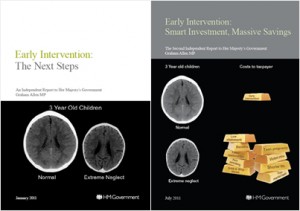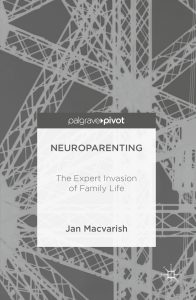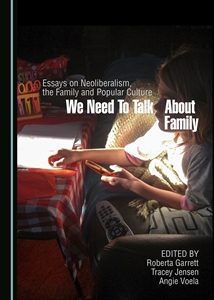Biologising Parenting: Neuroscience Discourse and English Social and Public Health Policy, Ellie Lee, Pam Lowe and Jan Macvarish
This study was funded by the Faraday Institute’s ‘Uses and Abuses of Biology’ funding programme.
This two-year study traced and critiqued the adoption by UK policy-makers of the idea that ‘new brain research’ offers new ways of understanding how parents ought to raise their children. Since the late 1990s, ‘brain claims’ have entered parenting discourse in the USA, Canada, Australia, New Zealand and the UK. ‘Brain claims’ tend to emphasise the extreme vulnerability of the infant brain to the influence of parents, thereby raising the stakes of parenting and concretizing ideas of parental determinism. Neuroscience has been appropriated by policy advocates to argue for early intervention into parent-child relationships in the name of preventing social problems. The project entailed an analysis of family-related social and public health policy documents since 1998, a review of existing literature critical of the development of ‘brain claims’ in family policy in the UK and elsewhere, and a review of historical literature to contextualise current trends within a longer history of efforts to ‘save’ children from their parents.
Reports by Labour MP and advocate of brain-based early intervention, Graham Allen.
Books published from the project
Neuroparenting: The Expert Invasion of Family Life by Dr Jan Macvarish is published by Palgrave Macmillan (7 September 2016). The book traces the growing influence of ‘neuroparenting’ in British policy and politics. Neuroparenting advocates claim that all parents require training, especially in how their baby’s brain develops. Taking issue with the claims that ‘the first years last forever’ and that infancy is a ‘critical period’ during which parents must strive ever harder to ‘stimulate’ their baby’s brain just to achieve normal development, the author offers a trenchant and incisive case against the experts who claim to know best and in favour of the privacy, intimacy and autonomy which makes family life worth living.
The book will be of interest to students and scholars of Sociology, Family and Intimate Life, Cultural Studies, Neuroscience, Social Policy and Child Development, as well as individuals with an interest in family policy-making.
We Need To Talk About Family: Essays on Neoliberalism, the Family and Popular Culture, published by Cambridge Scholars, includes a chapter, ‘Understanding the Rise of Neuroparenting’ by Jan Macvarish, Ellie Lee and Pam Lowe.
Papers published from the project
Biologising parenting: neuroscience discourse, English social and public health policy and understandings of the child, Sociology of Health and Illness, February 2015.
Growing better brains? Pregnancy and neuroscience discourses in English social and welfare policies, Health, Risk and Society, January 2015.
‘The ‘First Three Years’ Movement and the Infant Brain: A Review of Critiques’ Sociology Compass, Volume 8, Issue 6, pages792-804, June 2014.
Uses and Abuses of Biology Key Findings Report (PDF) 2014 Summary report of key findings from the Biologising Parenting: Neuroscience Discourse and English Social and Public Health Policy study.
Dissemination event and related resources
An event to discuss and debate findings from this project was held at Birkbeck, University of London on 28 March 2014. The following are resources from that event.
Event programme: The Uses and Abuses of Biology: Neuroscience, Parenting and Family Policy in Britain (PDF).
‘Distortions of Neuroscience’, Keynote Lecture by John Bruer, voice recording and PPT slides.
Spiked-online interview with John Bruer by Helene Guldberg
‘Biologising Parenting; Neuroscience Discourse and English Social and Public Health Policy’, presentation by Jan Macvarish, PPT slides.
‘Brain Science and Early Intervention’, presentation by Val Gillies.
‘Early Intervention and Practitioners’ Views’, presentation by Nicola Horsley.
Article by Dr Jan Macvarish on the ‘Baby Bonds’ report
Guardian article by Zoe Williams discusses the conference
Free Range Kids Blog discusses the study
Guardian interview with John Bruer
Selected conference papers and presentations
Medicalization and Moral Claims: Health care policies concerning the family and their effects on the moral understanding of the family (PDF). Paper given at the Symposium, ‘Between relational autonomy and trust’, Goettingen University, Germany, July 2011
A policy driven by prejudice masquerading as research: brain science and English social policy (Slideshare). Paper given at the ESRC Symposium: Kinship & Genetic Journeys, Newcastle University, 23-24 February 2012
Biologising parenting: neuroscience discourse and parenting culture (PDF). Paper given at ‘The Family in Crisis? Neoliberalism and the Politicisation of Parenting and the Family’. University of East London, 28 June 2013
Biologising Parenting: Neuroscience Discourse and English Social and Public Health Policy (Slideshare). Paper given at workshop for participants in the ‘Uses and Abuses of Biology’ research programme. University of Cambridge, 21 September 2013
Other sources relevant to the project
Babies, Brains and Bull****
This is footage of a discussion filmed at the Battle of Ideas Festival 2013. Speakers included Professor Val Gillies (co-investigator for the study ‘Brain Science and Early Intervention’ ) and the Chair and co-convenor of the discussion was CPCS’ Jan Macvarish.



